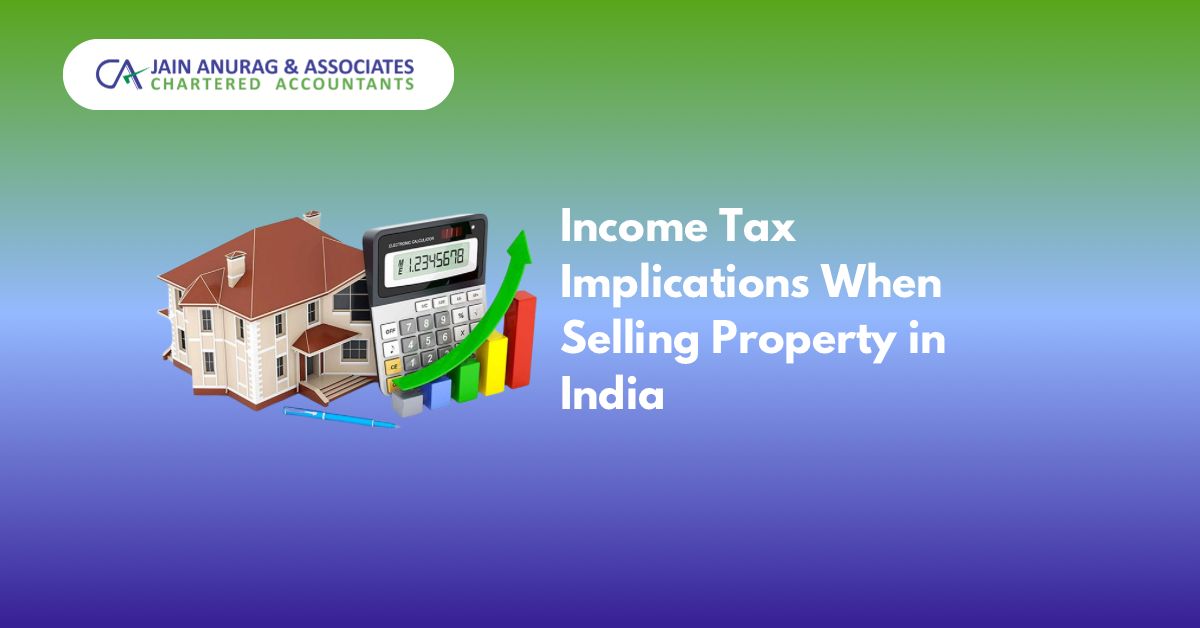Jan 09, 2025, Posted by Admin
Income Tax Implications When Selling Property in India

Selling property in India comes with a host of income tax implications, especially when it comes to capital gains tax. Understanding how taxes are calculated and what exemptions are available can help you manage your finances better and potentially save money. Here’s a simplified breakdown of what you need to know.
Understanding Capital Gains Tax
The primary tax liability when selling property in India arises from capital gains, which depend on factors such as the holding period, residential status of the seller, and the type of property sold.
Short-Term Capital Gains (STCG)
• Applicable if the property is held for 24 months or less.
• Gains are taxed at the seller's income tax slab rate.
Long-Term Capital Gains (LTCG)
• Applicable for properties held for more than 24 months.
• Taxed at 12.5% without indexation or 20% with indexation, depending on the purchase date:
→ If purchased on or before July 22, 2023, sellers can choose between the two options.
→ For properties purchased on or after July 23, 2023, only the 12.5% rate applies.
→ Indexation benefit is not available for NRIs so only 12.5% rate will be applying for them.
How Are Capital Gains Calculated?
For Long-Term Capital Gains
1. Full Value of Consideration: The sale price of the property.
2. Deduct: Indexed Cost of Acquisition/Improvement: Adjusted for inflation using the Cost Inflation Index (CII).
3. Deduct: Transfer Expenses: Includes brokerage, legal fees, etc.
4. Net Capital Gains: The taxable LTCG amount.
For Short-Term Capital Gains
1. Full Value of Consideration: The sale price.
2. Deduct: Actual Cost of Acquisition.
3. Deduct: Transfer Expenses.
4. Net Capital Gains: The taxable amount.
Exemptions to Save on Long-Term Capital Gains Tax
The Income Tax Act provides certain exemptions to reduce LTCG liability:
1. Section 54:
• Exemption for reinvestment in another residential property within a specified timeframe.
• Timeframe:
→ Purchase: 1 year before or 2 years after the sale.
→ Construction: Within 3 years from the sale date.
2. Section 54EC:
Exemption for investing in specified bonds (e.g., NHAI, REC) within 6 months from the date of the transfer.
3. Section 54F:
Applicable for assets other than residential property, provided the proceeds are reinvested in a residential house.
Important: Budget 2023 introduced a cap on exemptions under Sections 54 and 54F. The maximum claimable amount is ₹10 crores.
TDS (Tax Deducted at Source) Obligations
• Buyers must deduct 1% TDS under Section 194-IA if the property value exceeds ₹50 lakh.
• For non-resident sellers, TDS is higher: • 20% for LTCG. • Applicable income tax slab rate for STCG.
Tax Implications for Non-Residents
Non-resident property sellers in India face distinct tax liabilities:
• Long-Term Capital Gains: Taxed at 12.50%.
• Short-Term Capital Gains: Taxed as per income tax slab rates.
Determining the Sale Value for Tax Purposes
• Joint Ownership: Each beneficiary co-owner is taxed based on their share of the ownership.
• Stamp Duty Valuation: If the sale price is lower than the property’s stamp duty value, the latter is considered the sale price for tax calculations.
Essential Documents for Filing Taxes
Keep the following documents handy for accurate tax computation and filing:
1. Sale/Purchase Deeds: Original agreements for both purchase and sale.
2. Improvement Costs: Receipts for renovations or improvements.
3. Advance Payment Receipts: If any amount was received prior to the sale.
4. Valuation Report: For properties purchased before April 1, 2001, a registered valuer’s report is required.
Final Thoughts
Selling property in India involves important planning, especially when navigating the nuances of capital gains tax. By understanding the tax rules, leveraging available exemptions, and maintaining proper documentation, you can effectively manage your tax liabilities and maximize your savings. For any uncertainties, consulting a tax expert or financial advisor is always a wise move.